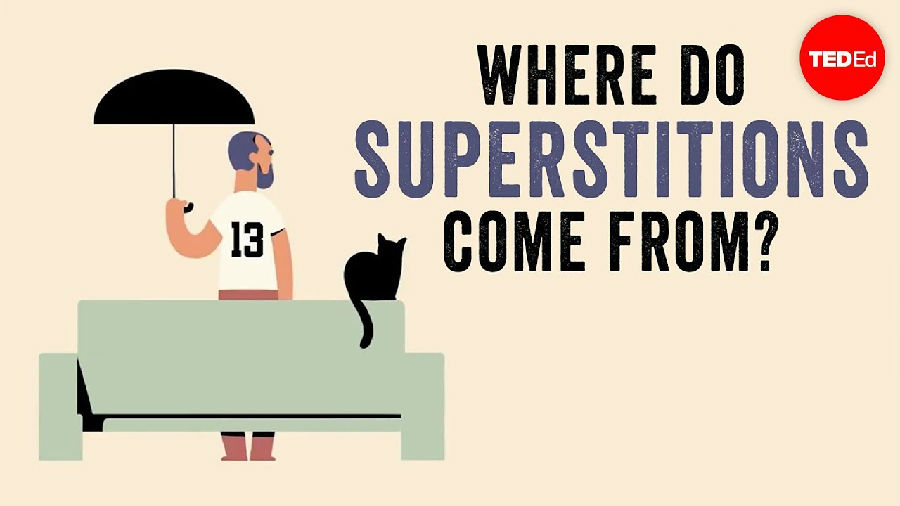(单词翻译:单击)
Are you afraid of black cats?
你害怕黑猫吗?
Would you open an umbrella indoors?
你会在室内打伞吗?
And how do you feel about the number thirteen?
你忌讳数字13吗?
Whether or not you believe in them, you're probably familiar with a few of these superstitions.
无论你相信与否,估计这些迷信对你来说并不陌生。
So how did it happen that people all over the world knock on wood, or avoid stepping on sidewalk cracks?
那么为什么世界各地的人都会敲木头,或者避免踩在人行道的砖缝?
Well, although they have no basis in science,
尽管在科学上缺乏依据,
many of these weirdly specific beliefs and practices do have equally weird and specific origins.
这些令人匪夷所思的迷信和做法确实有着奇怪而特别的起源。
Because they involve supernatural causes, it's no surprise that many superstitions are based in religion.
由于涉及一些超自然因素,许多迷信的起源与宗教有关。
For example, the number thirteen was associated with the biblical Last Supper,
比如说,数字13就与圣经里最后的晚餐有关,
where Jesus Christ dined with his twelve disciples just before being arrested and crucified.
耶稣基督和十二个门徒吃饭,随后耶稣被抓并被钉在十字架上。
The resulting idea that having thirteen people at a table was bad luck
因此人们认为一桌13个人会带来厄运,
eventually expanded into thirteen being an unlucky number in general.
后来13慢慢变成一个不吉利的数字。
Now, this fear of the number thirteen, called triskaidekaphobia, is so common
现在被称为十三恐惧症的现象变得非常普遍,
that many buildings around the world skip the thirteenth floor, with the numbers going straight from twelve to fourteen.
以至于世界各地很多建筑都跳过第13层,直接从12跳到14。
Of course, many people consider the story of the Last Supper to be true
当然,很多人相信最后的晚餐是真实存在的,
but other superstitions come from religious traditions that few people believe in or even remember.
但是其他来源于宗教的迷信,就没有那么多人知道或者相信。
Knocking on wood is thought to come from the folklore of the ancient Indo-Europeans
敲击木头被认为源于古代印欧的民间故事,
or possibly people who predated them who believed that trees were home to various spirits.
或是可能源于更早之前的人们,他们相信树木是各种神灵的家。
Touching a tree would invoke the protection or blessing of the spirit within.
抚摸树木可以得到保护或者受到神灵的保佑。
And somehow, this tradition survived long after belief in these spirits had faded away.
而且,尽管人们不再相信这些神灵,这个传统却保留了下来。
Many superstitions common today in countries from Russia to Ireland are thought to be remnants of the pagan religions that Christianity replaced.
现在从俄国到爱尔兰许多国家的迷信都被认为是基督教之前的异教徒留下的。
But not all superstitions are religious. Some are just based on unfortunate coincidences and associations.
但不是所有的迷信都与宗教有关。有些来源于不幸的巧合和联想。
For example, many Italians fear the number 17
比如,很多意大利人害怕17这个数字,
because the Roman numeral XVII can be rearranged to form the word vixi, meaning my life had ended.
因为罗马数字十七可以重组为vixi,意思是我的生命到头了。
Similarly, the word for the number four sounds almost identical to the word for death in Cantonese,
同样,数字4的发音在粤语中听起来和死是一样的,
as well as languages like Japanese and Korean that have borrowed Chinese numerals.
这在日语和韩语里也一样,它们借用了中国数字。

And since the number one also sounds like the word for must, the number fourteen sounds like the phrase must die.
由于数字1听起来像要,数字14听起来像要死。
That's a lot of numbers for elevators and international hotels to avoid.
于是电梯和国际酒店都避免使用这些数字。
And believe it or not, some superstitions actually make sense, or at least they did until we forgot their original purpose.
无论你信不信,有些迷信其实是有道理的,至少是在我们了解它们渊源的前提下。
For example, theater scenery used to consist of large painted backdrops,
比如说,过去舞台的背景板由大块的布景组成。
raised and lowered by stagehands who would whistle to signal each other.
舞台助理需要通过吹口哨来示意拉上或是放下布景。
Absentminded whistles from other people could cause an accident.
其他人随意吹口哨可能引起意外。
But the taboo against whistling backstage still exists today, long after the stagehands started using radio headsets.
但是后台不允许吹口哨的禁忌现在仍然存在,尽管人们很久以前就已经开始用耳机沟通。
Along the same lines, lighting three cigarettes from the same match really could cause bad luck
同样的,一根火柴点三根烟确实会带来厄运,
if you were a soldier in a foxhole where keeping a match lit too long could draw attention from an enemy sniper.
如果你是一名藏在掩体的士兵,一根火柴燃烧太久会引起敌军狙击手的注意。
Most smokers no longer have to worry about snipers, but the superstition lives on.
大多数烟民无需再担心狙击手,但是这一迷信依然存在。
So why do people cling to these bits of forgotten religions, coincidences, and outdated advice?
那么为什么人们依然相信这些被遗忘的信仰、巧合以及过时的忠告?
Aren't they being totally irrational?
他们是完全不理性吗?
Well, yes, but for many people, superstitions are based more on cultural habit than conscious belief.
没错,但是对于有些人,迷信更多的源于传统习俗而非有意识的信仰。
After all, no one is born knowing to avoid walking under ladders or whistling indoors,
毕竟没有人一出生就知道要避免在梯子下面走,或是在室内打口哨,
but if you grow up being told by your family to avoid these things, chances are they'll make you uncomfortable,
但是如果家人告诉你要避免这些,这些迷信就有可能会令你不安,
even after you logically understand that nothing bad will happen.
哪怕过后你理性地明白没有坏事会发生。
And since doing something like knocking on wood doesn't require much effort,
而且,像敲一下木头这样很简单,
following the superstition is often easier than consciously resisting it.
遵从迷信的做法比有意识地抗拒它更容易。
Besides, superstitions often do seem to work.
况且迷信常常似乎有效。
Maybe you remember hitting a home run while wearing your lucky socks.
你可能记得穿着你的幸运袜子打了一个全垒打。
This is just our psychological bias at work.
这其实只是我们的心理作用。
You're far less likely to remember all the times you struck out while wearing the same socks.
你很可能不记得有多少次你出局的时候也穿着同样的袜子。
But believing that they work could actually make you play better by giving you the illusion of having greater control over events.
但是相信它们有用确实会让你打得更好,让你感觉对比赛有更大把握。
So in situations where that confidence can make a difference, like sports,
所以像在体育运动中,信心可以起到关键性的作用,
those crazy superstitions might not be so crazy after all.
那些看似荒唐的迷信便不显得那么荒唐了。


